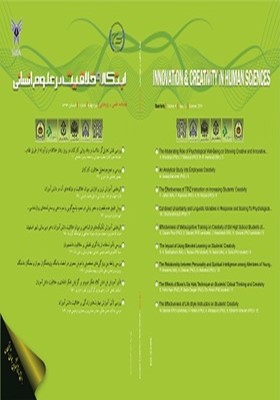The Moderating Role of Psychological Well-Being on Showing Creative and Innovative Behavior through the Suggestion System
Subject Areas : Creativity and innovation from psychological, epistemological, educational and pedagogicalAlireza Khorakian 1 , Yaghoob Maharati 2 , Mohammad Rasoul Heshmati 3 *
1 - دکترای مدیریت نوآوری و استادیار گروه مدیریت دانشگاه فردوسی مشهد a.khorakian@um.ac.ir
2 - دکترای مدیریت کارآفرینی و استادیار گروه مدیریت دانشگاه فردوسی مشهد maharati@um.ac.ir
3 - کارشناس ارشد مدیریت بازرگانی دانشگاه فردوسی مشهد (نویسنده مسئول) rasoul.heshmati_mgr@yahoo.com
Keywords: motivation, psychological wellbeing, Suggestion System, Human Resource, Creativity and Innovation,
Abstract :
Background: Organizations in a globalized society are experiencing external challenges and changes more than ever before. In order to adapt and react to these changes, creativity and innovation are seen as the most important means. The standpoint in this research was that all employees have creative potential, and how the creative potential is expressed may depend on variables in the organizational context. Participative management as a new approach in management through suggestion system can help organizations to exploit the creative potential and intellectual capital of employees. Suggestion systems offer the opportunity for organizations to benefit directly from their employees’ innovativeness and creativity. Objectives: This study intended to investigate the moderating role of "Psychological Wellbeing"in relationship between "Valence of Suggestion System" and "Motivation to Submit Creative Suggestion". The importance of studying creativity and suggestion system has been admitted and investigated in many researches. Therefore, this study aimed to help organizations to utilize the creative potential of employees through improve participation in suggestion system considering psychological well-being and valence of suggestion system variables. Methods: Statistical population of this research consists of employees of Ferdowsi University of Mashhad. A questionnaire with Lickert’s 5-scale spectrum was distributed among employees. Method of research was correlation and moderated multiple regression was employed to test hypotheses. Results: Regression analysis revealed that psychological well-being moderated the relationship between valence of suggestion system and motivation to submit suggestion. Conclusion: The results of the current study have implications for managers and practitioners of suggestion system to improve motivation of employee to submit creative idea.

